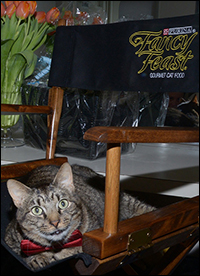
*
Ask Playbill.com answers your (and sometimes our own) theatre-related questions. To ask a question, email [email protected]. Please specify how you would like your name displayed and please include the city in which you live.
*
With the arrival of Breakfast at Tiffany's on Broadway, and the many colorful news accounts about the various felines that were hired (and fired) to play Holly Golightly's famously unnamed cat, "Cat," Playbill.com's staff got to thinking. We could think of many instances when dogs have been in Broadway shows. But when's the last time a cat had a major part on Broadway? And what are the differences in handling dogs and cats on stage?
Dogs are no strangers to Broadway. You need only look as far as this season's revival of Annie to find a prominently placed stage pooch. Other titles that have featured hounds come easily to mind. A few include the musical Legally Blonde; A Christmas Story, The Musical; The Will Rogers Follies (which included an entire dog act); Oliver!; Camelot; Gypsy; Nick and Nora — the list goes on. But cats? "In my research, the only big theatre piece that had a cat was Bell, Book and Candle," said Tony-winning animal trainer Bill Berloni, who has worked on 23 Broadway shows and countless regional and touring productions. John Van Druten's 1950 comedy about modern witches had, among its characters, a black cat called Pyewacket. "From what I've read, whatever the cat did was great. And it ran for a long time. It was a big hit."
Berloni works with all sorts of animals, including dogs, cats, mice, birds, sheep and pigs. But dogs make up "99.8 percent" of his business. He has done a total of three shows that have featured cats. "The first was a musical by Martin Charnin called The First, about Jackie Robinson. The second was a play directed by Eva Le Gallienne, starring Kate Burton, called Alice in Wonderland. And most recently, The Lieutenant of Inishmore."
In the latter, Martin McDonagh's black comedy about a man too crazy for the IRA, the suspected death of a black cat called Wee Thomas results in several gruesome murders. "On that, because it was a key to the story, they asked me not to have credit in the program." (The audience yowled with laughter at the feline's appearance in the play at Off-Broadway's Atlantic Theater Company; the production moved to Broadway.)
| |
 |
|
| Breakfast at Tiffany's co-star Chessie. | ||
| photo by Monica Simoes/Breakfast at Tiffany's |
So how do you make a cat do your bidding on stage?
"You don't," replied Berloni.
"Whenever I get a cat job," he continued, "I find a cat with atypical feline behaviors. Basically, a cat who thinks he's a dog; a cat who would be a social outcast in the cat world. But those cats are like one in a thousand. You really have to look for that cat. And you usually build the behaviors in the play around what the cat's natural abilities are."
Once you've found the cat, the real work begins. "Then you need a cat who will go out in public and do that," he said. "Which, again, goes against the grain. They'd rather be solitary and hidden. It's against their nature."
"The notion that you can force any types of creature to do man's will," he added, speaking from years of experience, "is kind of ludicrous."
Do we not see many cats in many plays because playwrights, directors and producers know cats are hard to work with, and thus avoid including them in stage stories? "The smart ones do," said Berloni.
Know of a play or production that includes a cat? Write us at [email protected].









